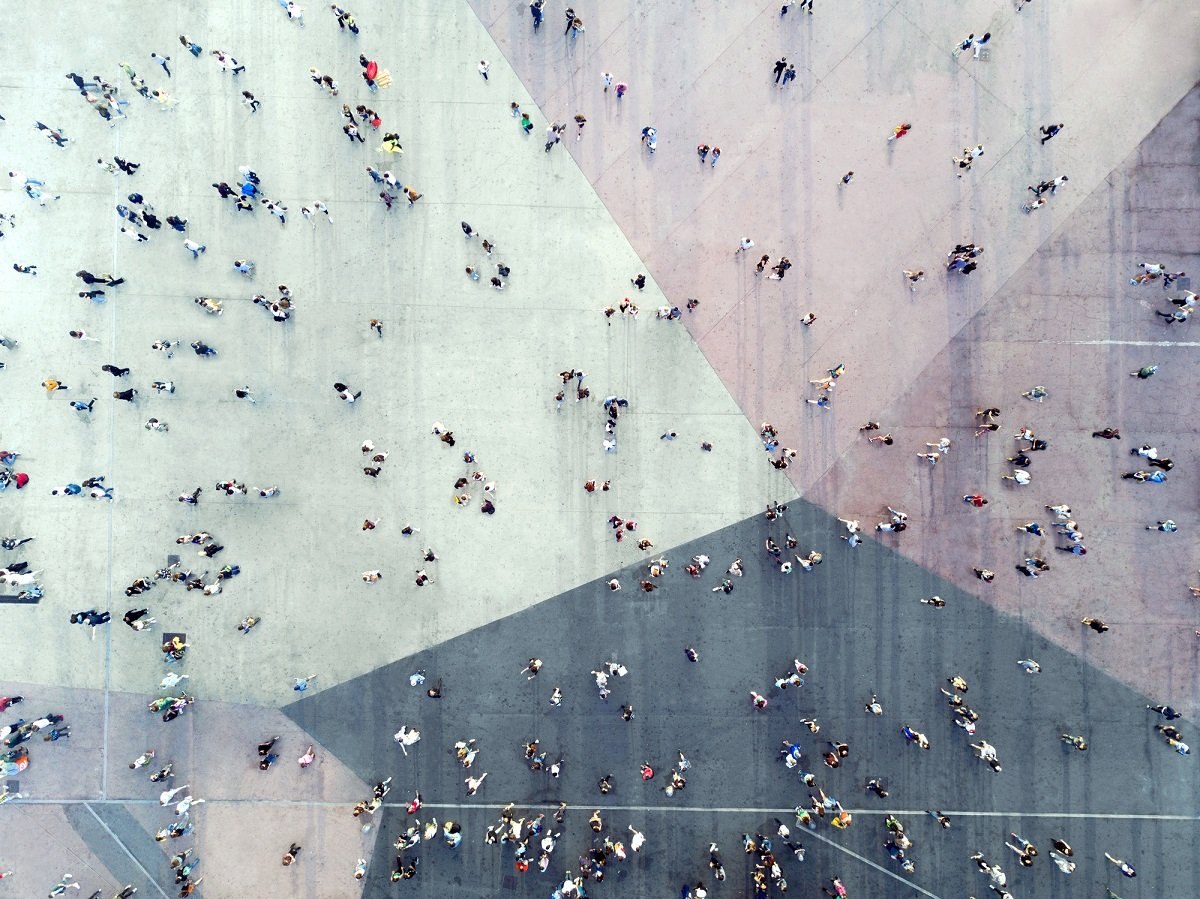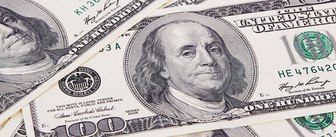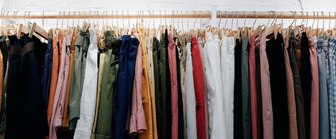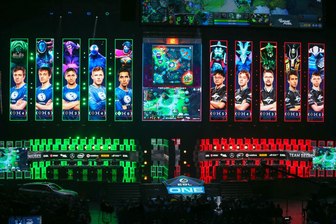Tech and tech-enabled brands continue to dominate our 2020 rankings of the best global brands – as determined by consumers around the globe.
Indeed, eight of the top ten best global brands are technology-based, with the only exceptions being retailers IKEA and Nike. Google tops the rankings for the fourth year in a row.
Our ‘Best Global Brand’ rankings are calculated using data we collect from members of the public in markets around the globe every day, for our BrandIndex tool. Every brand’s performance is tracked daily against a range of metrics and our Best Global Brands ranking is determined using their Index score – which assesses overall brand health. It takes into account perceptions of a brand’s reputation; whether consumers would recommend the brand; and whether it represents good value and quality.
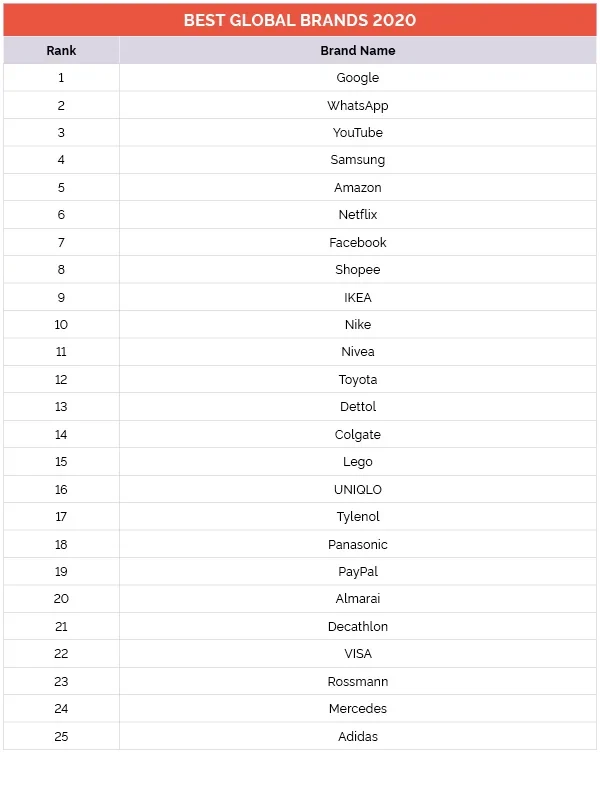
YouGov BrandIndex draws data from 11 million interviews across 40 sectors and 40 markets globally. This year’s ranking includes the views of more of the world’s consumers than ever before from the world’s biggest economies, including USA, China, Japan, Germany, India and the UK.
The ranking features the same top four – in the same order - as last year. Behind information giants Google, come WhatsApp, YouTube and Samsung. Amazon then moves up from sixth in last year’s ranking to fifth this year, as it plays an even bigger role in people’s pandemic lives. Netflix is another improver, moving from tenth in 2019 to sixth in 2020. Meanwhile, PayPal falls out of the top ten altogether, replaced by online shopping platform Shopee.
In a sign of how the world’s economy continues to change, only half of the top ten focus on selling (or enabling the sale of) physical goods – Samsung, Amazon, Shopee, IKEA and Nike. The rest make their money in other ways (if they do at all).
The rankings beyond the top ten have more of a traditional flavour, with some names like oral health brand Colgate, skincare brand Nivea and confectionary-maker Cadbury having been sold to consumers for more than a century.
Toyota and Mercedes are the only car manufacturers to make the top 25, with the former having climbed eight places in this year’s rankings. The Japanese automaker has come a long way since the recall scandal which rocked the brand ten years ago.
Panasonic is Samsung’s only electronics rival in the top 25, although it scores significantly less than its South Korean rival. LG falls out of the ranking this year, having placed 18th in 2019.
Other familiar brands to make it into the top 25 include toy brand Lego, painkiller Tylenol, sports kits retailer Decathlon (who now have stores in 56 markets) and financial services provider VISA. VISA is one of four Olympic sponsors in the ranking and one of two FIFA World Cup sponsors.
Two MENA-region brands made the top 25 last year but only one survives for 2020 – dairy and juice company Almarai. Fast-food company ALBAIK drops out.
Rossmann is another name which may be unfamiliar outside its home markets of Germany and Poland but whose reputation elevates it into our top 25.
Finally, a quick look at who didn’t make the top 25 ranking.
With many of the world’s holidaymakers forced to stay at home in the wake of the COVID19 pandemic, no airlines feature in the top places, although a number sit just outside. Likewise, there are no travel agents this year as Booking.com falls out of the top places.
The banking sector also fails to make a dent and, despite their global footprints, there’s no place for fast-food companies or carbonated drinks.
That just goes to show that, in the view of consumers across the world, being well-known is no guarantee of being considered one of the best brands.
YouGov BrandIndex draws data from 11 million interviews across 40 sectors and 40 markets globally. This year’s ranking includes the views of more of the world’s consumers than ever before from the world’s biggest economies, including USA, China, Japan, Germany, India and the UK.
The ranking features the same top four – in the same order - as last year. Behind information giants Google, come WhatsApp, YouTube and Samsung. Amazon then moves up from sixth in last year’s ranking to fifth this year, as it plays an even bigger role in people’s pandemic lives. Netflix is another improver, moving from tenth in 2019 to sixth in 2020. Meanwhile, PayPal falls out of the top ten altogether, replaced by online shopping platform Shopee.
In a sign of how the world’s economy continues to change, only half of the top ten focus on selling (or enabling the sale of) physical goods – Samsung, Amazon, Shopee, IKEA and Nike. The rest make their money in other ways (if they do at all).
The rankings beyond the top ten have more of a traditional flavour, with some names like oral health brand Colgate, skincare brand Nivea and confectionary-maker Cadbury having been sold to consumers for more than a century.
Toyota and Mercedes are the only car manufacturers to make the top 25, with the former having climbed eight places in this year’s rankings. The Japanese automaker has come a long way since the recall scandal which rocked the brand ten years ago.
Panasonic is Samsung’s only electronics rival in the top 25, although it scores significantly less than its South Korean rival. LG falls out of the ranking this year, having placed 18th in 2019.
Other familiar brands to make it into the top 25 include toy brand Lego, painkiller Tylenol, sports kits retailer Decathlon (who now have stores in 56 markets) and financial services provider VISA. VISA is one of four Olympic sponsors in the ranking and one of two FIFA World Cup sponsors.
Two MENA-region brands made the top 25 last year but only one survives for 2020 – dairy and juice company Almarai. Fast-food company ALBAIK drops out.
Rossmann is another name which may be unfamiliar outside its home markets of Germany and Poland but whose reputation elevates it into our top 25.
Finally, a quick look at who didn’t make the top 25 ranking.
With many of the world’s holidaymakers forced to stay at home in the wake of the COVID19 pandemic, no airlines feature in the top places, although a number sit just outside. Likewise, there are no travel agents this year as Booking.com falls out of the top places.
The banking sector also fails to make a dent and, despite their global footprints, there’s no place for fast-food companies or carbonated drinks.
That just goes to show that, in the view of consumers across the world, being well-known is no guarantee of being considered one of the best brands.
Methodology:
The brands in YouGov Annual Rankings were ranked based on the Index score, which is a measure of overall brand health calculated by taking the average of Impression, Quality, Value, Satisfaction, Recommend and Reputation.
For this year’s global list, YouGov used data from 33 markets – data from countries that cover three sectors or fewer were not counted in the top 10. The rankings use the Index score which assesses overall brand health. It takes into account perceptions of a brand’s reputation and whether consumers would recommend the brand to others, as well as whether it represents good value and quality.
